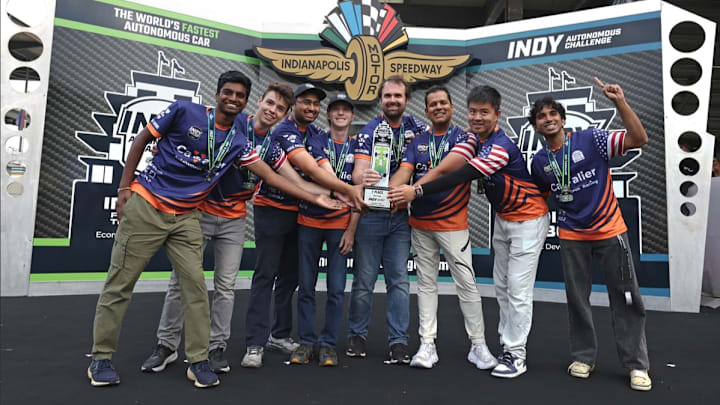UVA's "CAVCAR" Wins AI Racing Speed Trial at Indy Autonomous Challenge

In a competition featuring the world's fastest autonomous racecars, driverless vehicles powered by advanced artificial intelligence, a car built by the University of Virginia proved to be the fastest. The robot car constructed by the Cavalier Autonomous Racing team, affectionately known as "CAR" or "CAVCAR", won the speed trial at the Indy Autonomous Challenge at the Indianapolis Motor Speedway last week with a top average speed of a little over 171 mph.
UVA’s Cavalier Autonomous Racing team made history at the @IndyAChallenge, winning the speed trial with a record 171 mph lap—the first U.S. team to do so! Facing fierce competition, the team shined on the global stage. https://t.co/HSEIBsTnFE@CS_UVA @UVAEngineers pic.twitter.com/7NWQDAiYAM
— UVA (@UVA) September 10, 2024
In the speed trial portion of the Indy Autonomous Challenge, each team gets eight laps to try to record the fastest average speed on a lap. It's not the top overall speed or the the fastest lap time that matters, but the fastest average speed recorded in a single lap. The CAVCAR got through the first five laps of its run before a yellow flag was raised due to rain on the track. After a brief delay to get the track dried with air blowers, the car returned to the track to finish its run.
Virginia's strategy for the speed trial was a little bit different than the other teams, who tried to reach top speeds immediately on the straightaways and then slowed down on the turns, mirroring the patterns of traditional motorsports. UVA's strategy was to keep a steady speed the entire way around the famed track at the Indianapolis Motor Speedway and gradually increase that speed on each lap, all the while allowing the AI of the vehicle to gather information and see how fast it can go around each turn while maintaining the optimal line.
That strategy ultimately paid off, as after the weather delay, UVA managed to get over the highly-sought after average speed of 170 mph on each of its last two laps, clocking in at 171.011 mph on the final lap. According to UVA Engineering associate professor Madhur Behl, who serves as the team principal, the CAVCAR unofficially posted a top speed of 184 mph on the final straightaway.
"This speed is the fastest the Indy Autonomous Challenge has ever seen in any race," Behl said.
For those interested in seeing the CAVCAR in action, the entire six-hour event was streamed at the YouTube link below. UVA's run in the speed trial begins at 3:28:00. The run was delayed for weather at 3:35:15 and then the car returns to the track at 3:44:40, does a few warm-up laps, and then the moment UVA clocks the 170+ average speed is at around 3:51:45 in the video below:
The other portion of the Indy Autonomous Challenge is a passing competition, wherein each team takes turns defending and attacking a single-car pass attempt. It's a remarkable sight to see driverless vehicles using light and range detectors to adjust their course to avoid a collision while racing at top speeds. The CAVCAR performed well in the passing competition as well, reaching the semifinals.
There was a prize pot of $1 million up for grabs at the Indy Autonomous Challenge. The Cavalier Autonomous Racing team earned $100,000 for taking first place in the speed trial and an additional $75,000 total for qualifying for the race and for reaching the semifinals in the passing competition. With a team that is currently made up of four Ph.D. students, much smaller than most of the other teams in the competition, UVA is planning to use that reward money to grow its team.
To read more about the Cavalier Autonomous Racing team's achievements at the Indianapolis Motor Speedway last week, click here: UVA's Robot Racer Zooms to Victory at Indy Speedway

Matt launched Virginia Cavaliers On SI in August of 2021 and has since served as the site's publisher and managing editor, covering all 23 NCAA Division I sports teams at the University of Virginia. He is from Downingtown, Pennsylvania and graduated from UVA in May of 2021.
Follow mattynewtss